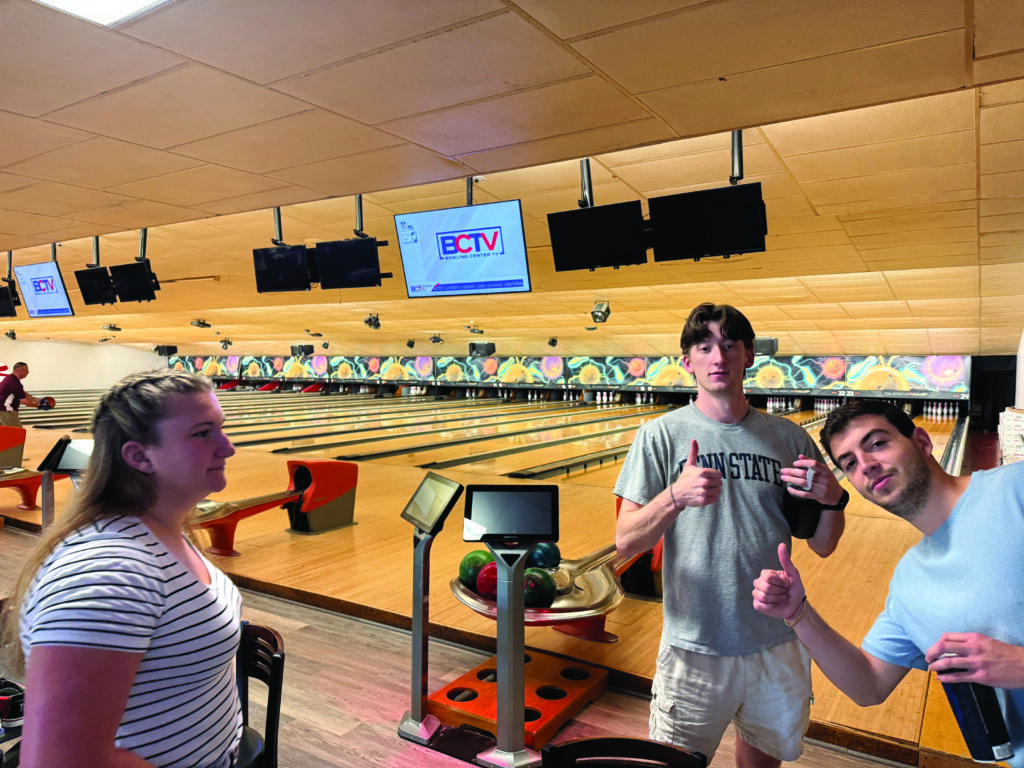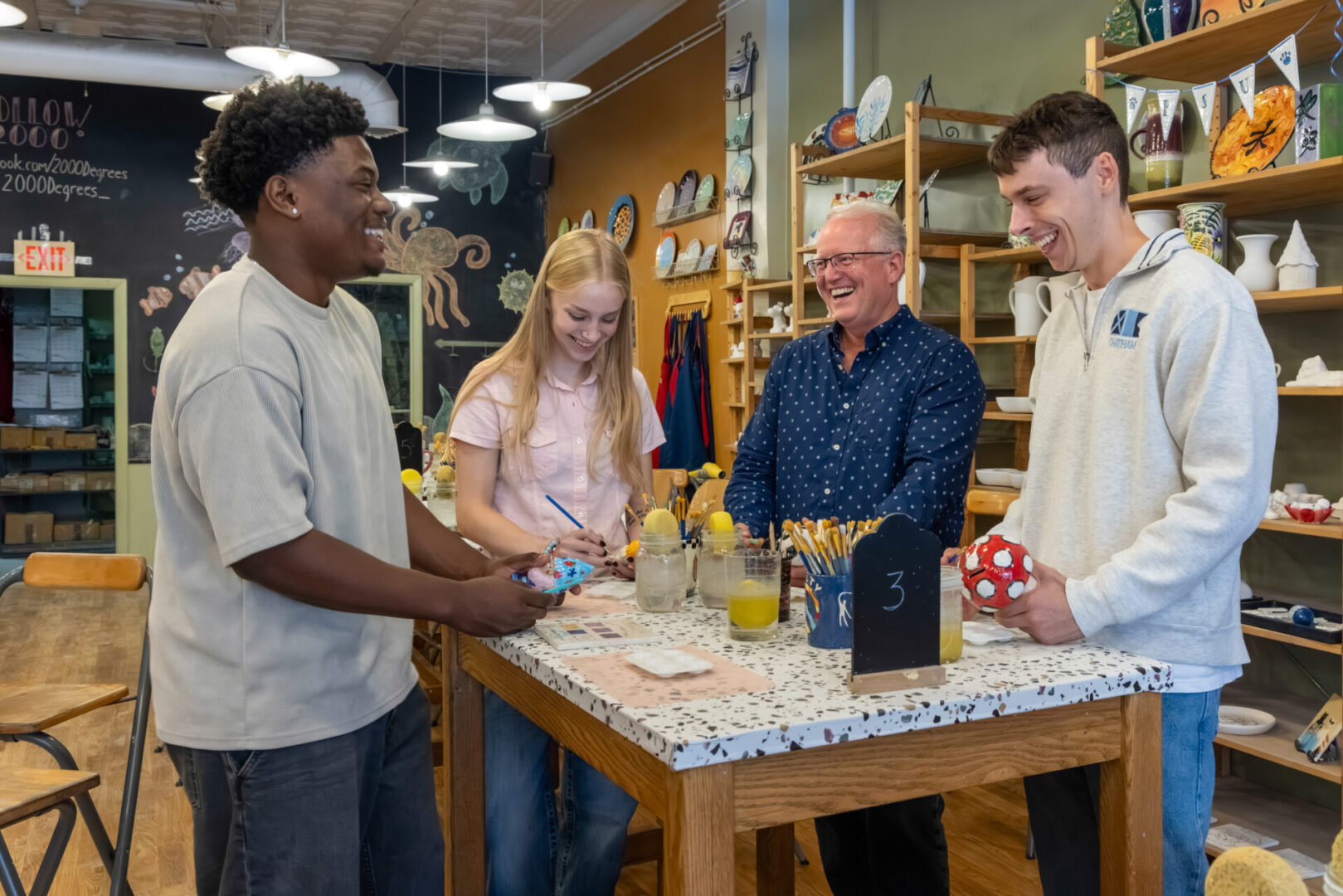When you talk to officials at the Downtown State College Improvement District, as well as at the Chamber of Business & Industry of Centre County, about skill gaps within the current Happy Valley workforce, a theme emerges. Incoming employees and new graduates need soft skills.
While technical, or “hard,” skills are important, employers see a dearth of potential hires who are capable of rolling up their sleeves and thinking on their feet, collaborating and leading, communicating, and forming relationships. It’s not just a local issue, either. It’s a nationwide problem recognized by the National Association of Colleges and Employers — and Penn State is responding.
Solving a skill gap? Make it simple
About a year ago, Penn State’s Impact Incubator formed with a handful of student research assistants and Kerry Small at the helm as director of operations. Small and his colleagues had long noticed this skill gap.
Sue Chappell, associate director of career services at Penn State, says, “Almost two-thirds of employers are using skills-based hiring and less are … looking at GPAs to screen candidates. When you think of ways in which we can have a high impact on our students’ experiences at Penn State, it’s in helping them acquire these skills. … There are some core skills or competencies that employers are pointing to, that they’re not seeing in graduates when they come into the workforce.
“Often, the number-one skill that employers are looking for students to bring into the workplace is critical thinking skills, that ability to apply what they’re learning in the classroom to a real-world project and find a solution,” she continues. “Being able to lead, being willing to step up and take a leadership role. Closely mirrored by that is teamwork, the ability to actually work on a team and find common ground in order to get the job done.”
The Impact Incubator seeks to teach skills like these through unique, approachable experiences that are available at no cost to students, providing equitable access across the board. The incubator’s student research assistants have built an exclusive app wherein groups of students can pick from among 40 local activities. After scheduling an activity, students are given a prompt that facilitates collaboration or connection skills, and then students are asked to reflect on what they learned from the experience after the fact.
As some examples, students might work on a collaborative art project at 2000 Degrees or head over to Tussey Mountain for a resort activity. They might go grocery shopping and cook a meal or go on a picnic together. They might go bowling or to a café, or volunteer.
On the surface level, the approach seems simple. The activities might be some that students engage with already. However, the intentionality and reflection, says Bob Orndorff, Penn State’s senior director of career services, make all the difference.
“The incubator builds in structured reflection, communication, and the emphasis to be a team player,” he says. “Students have been going bowling for a long time, but it’s all about, ‘How can you become a better team player, be intentional, and reflect on the interactions you had?’”
Chappell adds, “They’re pulling in all these skills — project management, critical thinking, teamwork, creative thinking, the opportunity to become a leader. … Every time we give them an opportunity to do that, they’re then better able to articulate to an employer how they [use] skills, how they’re transferable in the workplace, and have something on their resume that shows they know how to do something like this.”

Strengthening the town-gown relationship
Local organizations like the DID and CBICC are taking note of the Impact Incubator’s efforts.
Greg Scott, CBICC president and CEO, comments, “The workplace skills that the Impact Incubator works to build, including collaboration, connection, and active engagement, are vital across industries but are often cited by local employers as areas of concern. While these skills are harder to teach on the job, they are essential for long-term success in any organization.”
Likewise, Kendra Kielbasa, retail and commercial business advocate at the DID, says, “These soft skills that we’re talking about are the most desirable skills for employers. You can come in with specific skills — be it tech skills, engineering, whatever that may be — but at the end of the day, all businesses need employees that can communicate, be part of teams, and contribute positively in interactions.”
The Impact Incubator, however, does not just prepare Penn State students to enter the workforce — whether that’s locally or not — with desirable skillsets. It also strengthens the town-and-gown relationship, builds community, and supports local businesses in new ways.
“Many students live their lives between their apartments, the gym, and class,” Small observes. “Many of them don’t engage. They might not know Boalsburg exists, much less the cute little coffee shop there. We want them to lift their heads.”
The Impact Incubator’s early testing showed that, when students were given funds to complete their chosen skill-building activities, not only did they visit local venues, but they were also more likely to discover other local businesses along the way.
“This is economic development as much as it is workplace development,” Small says.
Kielbasa confirms, “[The Impact Incubator] is working with some very specific businesses in the Downtown Improvement District that create engagement and experiences for the students. The students know these are safe places where they can go, where they’re met with a smile. The staff, management, and ownership understand they’re there. They’re embracing the town-gown relationship and understanding that this is a community thing. … We want these students to see downtown as a place of creativity, learning, economics.”
She sees the Impact Incubator’s economic impact as also potentially lasting long after students graduate. Participating in the Impact Incubator, Kielbasa says, could introduce them to businesses that, five years from now, 10 years from now, or 20 years from now, they return to as alumni, bringing their friends and family members along.
“It’s sustaining long-term economic vitality,” she says. “If students have a good experience now, they’re returning as alumni, bringing their families, attending events, contributing philanthropically.”
She also notes that many Penn State alumni return to the area to start businesses, even if they have no other ties to the region.
Scott agrees, saying, “When students see more of Centre County than their campus, they’re more likely to invest in it through internships, jobs, volunteering, or launching new businesses, which has the potential to benefit our economy for the long term.”
A win-win all around
Looking to the future, the possibilities for the young Impact Incubator are bright. Small sees the potential to expand the incubator’s offerings to the entire Penn State freshman class, while Chappell hopes the incubator’s work might be replicable across all of Penn State’s commonwealth campuses.
With the right work, the incubator could also attract donors or industry partners who want to offer students branded experiences. It could likewise firmly establish Penn State as the university that reliably closes the skill gap for its graduates, driving graduate employment rates further and, in turn, increasing enrollment as students and parents seek the greatest ROI on their education investment.
It’s not just in the workplace that closing this skill gap matters, either, Orndorff points out.
“These competencies aren’t just good for your career,” he says. “They’re going to help you be a much more effective citizen, more active in the community, better parents. … Teamwork, communication, professionalism, equity, inclusion — they’re needed in the workplace, but they’re needed in life, too. This should be something that we all embrace as Penn State educators.”
Meanwhile, for the broader community, there’s the possibility of greater downtown student foot traffic and engagement leading to more and more new businesses opening — businesses locals have been clamoring for.
“The community wants different stores, different restaurants, and those things are determined by foot traffic and vehicle traffic,” Kielbasa says. “There are some more established businesses that look at coming to downtown and have interest, and quite frankly, our community wants them here and have expressed interest in that — but when [those businesses] are looking at the foot traffic and vehicle traffic, if it doesn’t meet their expectations, then they know that financially they may not make it here. We have to have the community come down and intentionally be here, be present, check it out.”
In total, the Impact Incubator’s impact is viewed as a positive all around — for Penn State students, the university as a whole, local businesses, and the community.
As Scott sums up, “By bridging the gap between academic learning and our business community, the incubator is laying the groundwork for greater connectivity, growth in key regional industries, and economic resiliency in Centre County. T&G
Holly Riddle is a freelance writer for Town&Gown.




